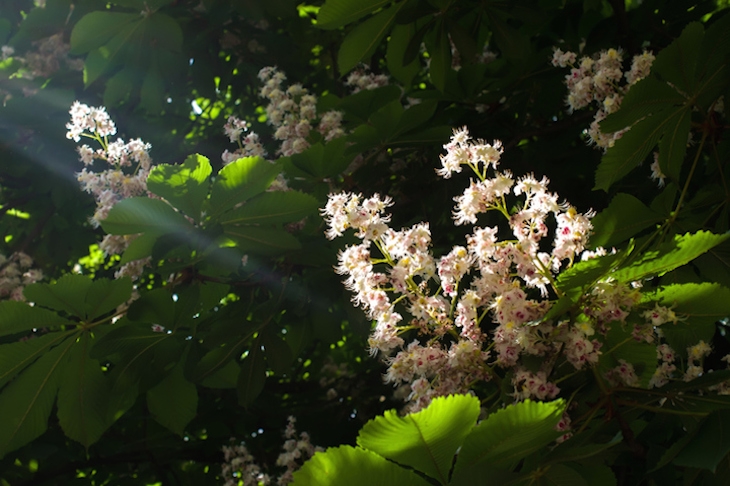Chez Frank is a popular local boar-hunters’ bar, tobacconist and general store at a lonely crossroads in the forest. It also serves daily lunches of no-nonsense French country food. There’s no menu; you get what you’re given. You like it or lump it. The chap who first told us about Chez Frank, now dead and missed, said on no account to tell anyone else about it, especially the local English milords, in case they flocked there and ruined the authenticity of the atmosphere. Catriona took me last Sunday to celebrate my no longer being depressed.
We sat at an outside table under the low boughs of a blossoming chestnut tree. The other tables were fully occupied with French speakers when we arrived, all heartily tucking in to the charcuterie starter, the contents of which it is usually best not to inquire about too deeply. In the way of things in France, we were greeted pleasantly by anyone who caught our eye and we in turn wished everybody bon appetit. On the white paper tablecloth of our table for two were arranged some eating irons and two heavy glass tumblers and everything was sprinkled with pink and white chestnut blossoms. A little blackboard on the wall said that today’s main course would be rabbit.
The table service Chez Frank is conducted by three generations of the extended family who own the place: the old lopsided grandfather, who doesn’t look at all well these days; his son, a 50-year-old countryman whose cells, if not his genes, are at least a quarter wild boar and perhaps a quarter bullock; this man’s imperturbable wife who both cooks and serves and generally flogs herself to death, though her personality dominates; and an 11-year-old girl with the mind and manner of a popular royal courtesan. Today the grandfather was more lopsided and unstable than ever. His son hadn’t shaved for about a week and was wearing an old T-shirt and work shorts. The girl was wearing a strappy, sexy pink slip with a glitter heart and espadrilles. Also present was a layabout teenage son — a tattooed, tragic chain-smoker who wandered lethargically and aimlessly in and out of the bar. Also patrolling the tables for windfalls and offerings was a restless, impetuous hunting dog with a brutally docked tail. It looked to me like a cross between a pointer and a spaniel. Its motives were entirely selfish. It neither suffered fools gladly nor allowed itself to be fondled by the patrons.
We sat. The girl said did we want a drink? We said we’d each have a pastis to start with. The part-boar part-man came out with two plates of charcuterie and a basket of sliced baguette and laid them among the chestnut blossoms. The thumbnail resting on the rim of the artisanal china plate looked like a huge toenail. When he’d gone we hunted amid the bread for foil-wrapped butter portions, found none, and tentatively set to. The charcuterie plate was sparsely arranged with thin slices of flesh of some kind, or organs, or perhaps glands, all mixed up in a sort of jigsaw held together with clear jelly. The girl carried out our tall glasses of pastis. They were wildly generous measures; the glasses were two thirds full of the aniseed spirit. She challenged me with her brown eyes to patronise her at my peril then swivelled on her heel. Between diluting mine with water and lifting it to my lips a chestnut blossom had fallen in to it. Catriona, I noticed, had half a dozen tiny chestnut blossoms stuck lightly in her hair.
‘Finished?’ said the man five minutes later, nodding curtly at the one remaining portion of charcuterie. We humbly admitted that yes, we had. He removed it. His wife ran out with a bowl of unadorned fusilli pasta and a bowl of piping hot rabbit stew and placed them on the table between us. The rabbit meat was attached to the split carcasses of two very muscular rabbits. It was perfectly cooked and very tasty. While we meticulously dismembered our carcasses, a farm tractor rumbled past and the man lost his temper with the dog and gave it a tongue-lashing. The dog leapt up on the stone wall and regarded him with an insolent grin.
The pastis was too strong for Catriona so I drank hers. We also had a pichet of rosé. After the rabbit, in quick succession, came the customary dinner plate with four slender portions of cheese, all different types, then a slice of pear tart with a six-inch striated line of squirty cream beside it, then a shot of espresso. The bill, handwritten on a plain sheet of paper, was presented by the little girl deadpan. Twenty quid each. We tipped out the last of the rosé into our tumblers and lifted them. ‘Prozac,’ I said. ‘To Prozac,’ said Catriona.







Comments